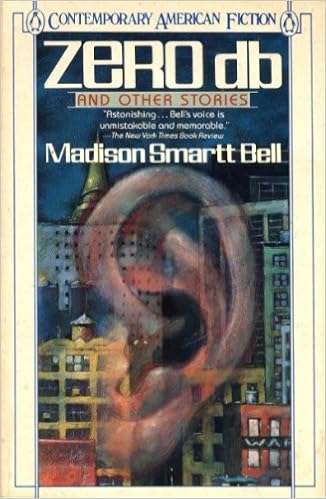I read this book nearly twenty-five years ago, back when I was in grad school. I went on to read another book of Bell's stories, which was about as good as this one. At the time, however, I don't know that I was necessarily that impressed. Rather, this was a book that stayed with me, the way a movie called The Conversation stayed with me, kept me thinking about it for weeks afterward.
The two stories that are my favorite in this collection fall at the start of the second section, which is my favorite section of the book. The book as a whole is set into three sections, with "three" being something of a motif in this work, as designated by the first and last stories of the first section. Those stories are called Tryptichs--they are stories in three parts.
Triptych I is about a little girl at a hog killing. Where Bell excels throughout the collection is in his somber attention to detail, and that's what makes this otherwise less interesting story impressive. It's set in the South, among black folk and white, and burning and accidents are something of a theme throughout the three disparate parts.
"The Naked Lady" is a powerful piece of wit and writing skill and was the one that most impressed me when I first read the collection. It's about the friend of an artist, their horrific home, the sculptures the artist creates, and the rats they kill.
"Monkey Park" is another sort of hopelessness--this one involving a couple that isn't.
"Triptych II" focuses on different ways of dying, one among peacocks, one an old man, and one a bull. The idea here seems to be that people are little more than animals in the end, facing their final hours. And it mirrors the final story in the collection.
The middle section includes six stories about young men (or a young man, as many of the stories seem to be about the same person and arguably all of them could be) fighting--or perhaps, more so, giving into--depression. "The Structure and Meaning of Dormitory and Food Services" involves a young man who goes off to college, does well for a few months, and then sinks into a morass wherein he stops bothering to attend classes and spends most of his days on the "sad" side of the university cafeteria. Here, a blind man is sat down by him each day, but the blindness is really the narrator's own, as he is lost without knowing how to escape his own lethargy.
"Irene" finds a young man living in a Hispanic neighborhood with cheap rent. The man knows little of his neighbors and few of them, but he forges a kind of fascination with a twelve-year-old girl that is at some level a bit creepy but at the same time a kind of cry for connection--with someone, anyone.
"The Lie Detector" involves a young man who loses his apartment and has to go find a new one. Thing is, his old landlord seems to be trying to stiff him on the deposit; his new landlord seems to be trying to ask for extra kickbacks in order for him to move in; and true to form, the narrator himself begins to apply similar sorts of dishonesty to grift a bit more cash for his needs.
"I Heart NY" involves a young man trying to do just the opposite--that is, to be a responsible and good citizen. He takes real interest in those around, but the city doesn't seem to care much for or about him, and when he tries to help others, it rarely works out. Police don't come to assist. Muggers he catches turn out to be the wrong person, and so on.
"The Forgotten Bridge" focuses on the same young man as in "Lie Detector" after he is in the new apartment--and on the relationships he forges with his Hispanic neighbors. There's a kind of sadness to the tale insofar as it's told from a distant time with a certain amount of nostalgia, though it's nostalgia for a time that was rough on all of the people involved.
"Zero db" is about a man who works on sound for motion pictures and other productions. Here, he's recording people in a bar after a particularly bad day at work.
The final section/story is "Today Is a Good Day to Die" and focuses on an officer in Custer's army out west who is rescued from a snow storm by the Indians Custer has tried to and will try again to kill. This leads to some uncertainty in the officer regarding his role and purpose in life.
Monday, January 13, 2020
On "Zero db and Other Stories" by Madison Smartt Bell *****
Labels:
Books,
Collections,
Five-Star Collections,
Madison Smartt Bell
Subscribe to:
Post Comments (Atom)







No comments:
Post a Comment